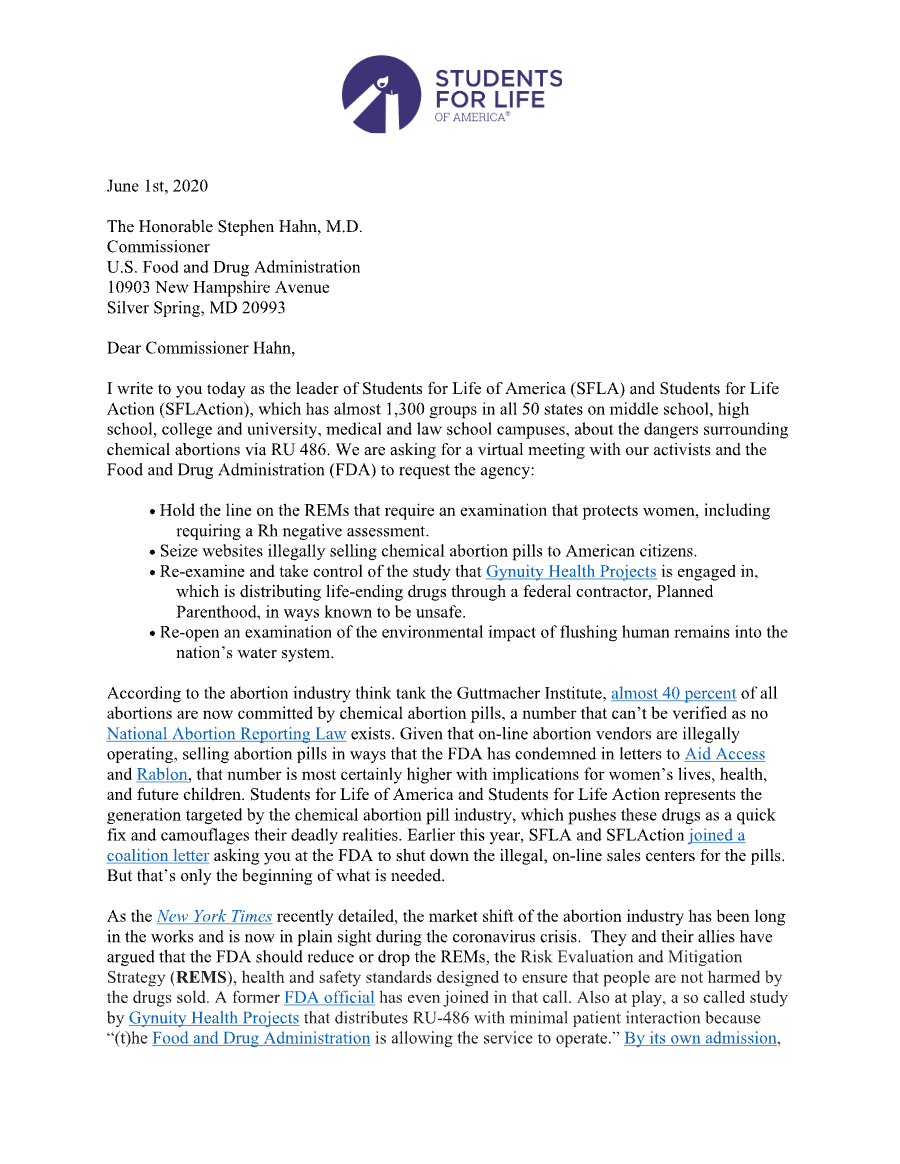
Since the harsh reality of Chemical Abortion Pills (their extensive harm to women and killing of the preborn) has not sunk in clearly enough yet for our society to reconsider these life-ending drugs, Students for Life of America (SFLA) has taken a new approach to show the harm caused to the environment – and we have found an unlikely ally.
Just as our “What’s In the Water?” Project looks at the negative, ecologic impacts of these pills, Ms. Magazine also published an article earlier this year along the same lines of “going green” with abortion. Here’s what you should know about the first (and probably last) thing SFLA and this rabidly pro-abortion outlet agree on:

In an article entitled “Environmental Justice Is An Abortion Rights Issue,” author Katherine Gladhart-Hayes’ biggest bone to pick with abortion restrictions is their effect on the environment — although people whose lives were saved via these laws may consider their effect on preborn children the most remarkable. Regardless, she is most concerned with the increased carbon emissions as a result of abortion-seeking women driving farther distances to abortion facilities. Gladhart-Hayes writes:
“Reproductive choices and climate change are intimately and inextricably connected… Environmental impact is an important part of protecting safe, legal and accessible abortion care, and moreover it is a consequence of abortion bans that we must not forget.”
She notes additionally that “the environmental cost of forcing this travel will ultimately impact us all.”

While this Ms. Magazine article focuses on environmental costs that may or may not be seen in the future, SFLA and Students for Life Action (SFLAction) are focused on a very similar question which impacts us all today.
What about the environmental costs of Chemical Abortion Pills in our water?
To answer this question and reel in the medical, ethical, and environmental disaster that is Chemical Abortion Pills, SFLA and SFLAction have begun the “What’s In the Water?” Project. This project will examine the consequences of Chemical Abortion Pills in our water as these drugs are both “a clinical abortion agent and potential endocrine disruptor that even the National Institutes of Health notes can impact more than just women,” said SFLAction and SFLA President Kristan Hawkins.
As the pro-abortion think tank Guttmacher Institute states that at least 54% of all abortions take place outside of abortion facilities, that means that this is a serious problem for America’s wastewater system.

As a first step in this process, a Citizens Petition has been sent to the Food and Drug Administration (FDA) on Red Bag Medical Waste. This solution could help protect animals, aquatic life, the environment, our food supply, and people from water which is polluted by Chemical Abortion drugs, as well as tainted with blood, tissue, and the human remains of such abortions.
SFLA and SFLAction have also sent targeted Freedom of Information Act (FOIA) requests to see whether states are testing for these life-ending drugs in the water — why? Because it’s important to demonstrate the “Don’t Ask, Don’t Tell” pro-abortion logic behind such negligent distribution of Chemical Abortion Pills.
In this campaign, Hawkins called upon environmentally concerned Congressional and state legislators to support Red Bag Medical Waste, saying, “Cemeteries in our sewer systems are ignored as Chemical Abortion Pill use has skyrocketed. Tainted blood, tissue, and human remains have been flushed away, without any hard look at what happens next, or what happens to us and the environment.”

(You can read more about this campaign HERE; click HERE to sign our Citizens Petition.)
Just as the Ms. Magazine article read, environmental concerns impact us all. While we do believe abortion is morally wrong regardless of how it is committed, everyone should be concerned how this particular method of abortion is affecting our environment. This issue is irrespective of personal feelings about abortion; instead, it’s something that people across the aisle should be able to agree on. After all, if Ms. Magazine and SFLA can find mutual ground, anyone can.
Click HERE to read about SFLA/SFLAction’s second Citizens Petition to the FDA.
READ NEXT: Of All Places, Catholic Universities Should Protect Pro-Lifers, Not Punish Them
Share this post
Recent Posts

Abortion Brags from Lily Allen & Hat from Cynthia Nixon Enrage Even Pro-Choice Americans. Can the Pro-Life Generation Take Some Credit?
11 Jul 2025
Young Mom Prayed for God’s Hand on Her Child – At Her Ultrasound Appointment, THIS Happened
11 Jul 2025
Letter to the FDA Regarding Chemical Abortion Drugs June 2020
10 Jul 2025
